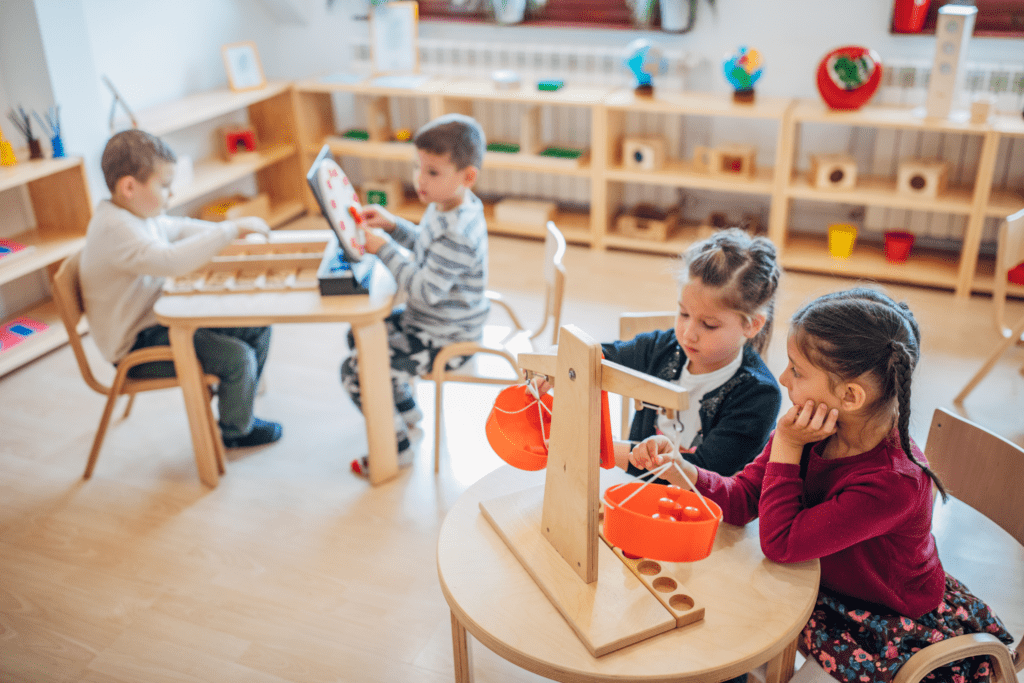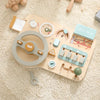Play is not just a way for children to pass the time; it is a critical part of their development, shaping their creativity, cognitive abilities, and social skills. One educational approach that has gained worldwide recognition for promoting purposeful and creative play is the Montessori method. Developed by Dr Maria Montessori in the early 20th century, this method emphasizes hands-on learning, independence, and nurturing a child’s natural curiosity. In the United Kingdom, parents and educators are increasingly recognising the value of Montessori principles, and integrating Montessori toys into everyday play has become a popular and effective way to foster learning in children.

Dr. Maria Montessori
Montessori toys are specifically designed to encourage active learning, allowing children to explore concepts through practical experiences. Unlike conventional toys that entertain passively, Montessori toys engage a child’s mind and body simultaneously. For example, the Wooden Color Shape Sorting Toys Drawer Box is an excellent example of this approach. It allows toddlers to sort shapes and colours, developing their fine motor skills, hand-eye coordination, and early problem-solving abilities. Scientific studies confirm that activities involving shape and colour recognition enhance cognitive development in early childhood by promoting neural connections responsible for visual discrimination and spatial reasoning (Gomez-Pilar et al., 2020).
Another core principle of the Montessori approach is fostering independence. By using toys that are easy to handle and encourage self-directed activity, children gain confidence and learn to solve problems on their own. The Montessori Toys for 3-6 Year Old Boys & Girls – Wooden Sorting & Stacking Toys exemplifies this perfectly. Children can sort wooden blocks by shape and stack them, developing spatial awareness and sequencing skills, all while enjoying a sense of accomplishment. Research shows that children who engage in self-directed learning activities demonstrate higher levels of intrinsic motivation and creativity (Lillard, 2017).

Wooden Sorting & Stacking Toys
Montessori toys also provide opportunities for open-ended play, where there is no single “right” way to play. This nurtures creativity by allowing children to experiment and explore different outcomes. The Large Wooden Tool Workbench for Kids – Colourful Construction Playset encourages imaginative construction and role-playing. Children can pretend to be builders, engineers, or designers, combining tools and materials in various ways. Such imaginative play has been linked to improved problem-solving skills, cognitive flexibility, and social understanding (Russ, 2004). By providing toys that are versatile and interactive, parents in the UK can create a home environment that mirrors Montessori classrooms, where children are empowered to take control of their learning.
The tactile and sensory aspects of Montessori toys are another significant advantage. Wooden toys, for instance, provide a natural texture and weight that plastic alternatives often lack. This sensory feedback is crucial for developing fine motor skills and hand strength. A study published in Early Childhood Research Quarterly (Case-Smith & O’Brien, 2014) highlights that sensory-rich activities are essential for early neural development and coordination. Products like the Wooden Color Shape Sorting Drawer Box combine tactile learning with cognitive challenges, ensuring children develop holistically while engaged in fun play.
Beyond cognitive and physical skills, Montessori toys support social and emotional development. Collaborative play with peers or guided interaction with parents can enhance communication, patience, and empathy. Using the Wooden Sorting & Stacking Toys, children often take turns, share materials, and negotiate roles during play. This type of structured yet flexible interaction aligns with Montessori principles, fostering emotional intelligence from an early age. Research indicates that children who engage in cooperative play demonstrate better social skills and adaptability later in life (Ginsburg, 2007).
Montessori toys also cater to the principle of “learning by doing.” Children naturally explore and learn through trial and error. For example, while playing with the Large Wooden Tool Workbench, they learn how to fit pieces together, experiment with balancing structures, and understand cause-and-effect relationships. These experiences form the foundation for scientific reasoning and logical thinking. Studies show that hands-on, experiential learning promotes long-term retention and understanding more effectively than passive observation (Hattie, 2009).
For parents and educators in Europe, particularly in the UK, investing in Montessori toys is a proactive step toward nurturing independent, creative, and capable learners. The benefits of Montessori play extend beyond academic skills, influencing problem-solving abilities, concentration, and even future career skills such as critical thinking and collaboration. Incorporating toys like the Wooden Shape Sorting Drawer Box, Wooden Sorting & Stacking Toys, and Large Wooden Tool Workbench into everyday play routines helps children develop these essential competencies in an enjoyable and engaging way.

Montessori principles also emphasise the importance of an aesthetically pleasing and orderly environment. Toys made of natural materials like wood not only provide durability and safety but also enhance the visual and tactile experience for children. A well-designed toy invites exploration and sustained attention, making learning an immersive experience. Wooden toys are free from harmful chemicals, making them suitable for young children, and their durability ensures that they withstand active play over time, providing lasting educational value.
Additionally, Montessori toys can be integrated into daily routines at home, transforming ordinary moments into learning opportunities. For instance, sorting toys can be used during clean-up time to teach organisation, while stacking toys can be used to demonstrate patterns, colours, and sequences during play. Parents can observe their children’s choices, guide exploration subtly, and reinforce concepts through playful interaction. This mirrors the Montessori classroom philosophy, where adults serve as guides rather than instructors, fostering curiosity and independent problem-solving.

Ultimately, the goal of Montessori play is not just to teach specific skills but to cultivate a lifelong love of learning. Children who grow up with Montessori toys develop a natural inclination toward exploration, creativity, and self-expression. These attributes are invaluable, forming a strong foundation for both academic success and personal growth. By offering products such as those available at Kidyz Store, parents in Europe can provide their children with tools that support meaningful play, creativity, and holistic development.
In conclusion, Montessori toys are more than just playthings; they are instruments that nurture a child’s mind, body, and spirit. Wooden educational toys like the Wooden Color Shape Sorting Drawer Box, Montessori Wooden Sorting & Stacking Toys, and Large Wooden Tool Workbench encourage children to think critically, explore creatively, and engage actively with their environment. By integrating these toys into daily routines, parents can create a stimulating, safe, and inspiring environment that fosters independent learning and lasting developmental benefits. Investing in Montessori play is an investment in a child’s future, encouraging curiosity, creativity, and confidence from an early age.
References:
-
Case-Smith, J., & O’Brien, J. C. (2014). Occupational Therapy for Children and Adolescents. Elsevier.
-
Ginsburg, K. R. (2007). The importance of play in promoting healthy child development and maintaining strong parent-child bonds. Pediatrics, 119(1), 182–191.
-
Hattie, J. (2009). Visible Learning. Routledge.
-
Lillard, A. S. (2017). Montessori: The Science Behind the Genius. Oxford University Press.
-
Russ, S. W. (2004). Play in Child Development and Psychotherapy. Lawrence Erlbaum Associates.
-
Gomez-Pilar, J., Romero-Ayuso, D., & Flores-Rojas, K. (2020). Cognitive development in early childhood. Frontiers in Psychology, 11, 570519.


Leave a Reply
Leave a comment and help other families discover new ways to play and learn.